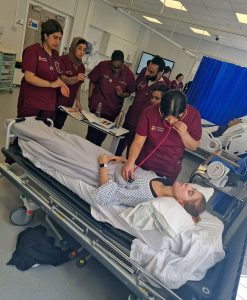
Last week saw us working online with our partners at Wolverhampton and Chester University. Although the role of the ACE is to work predominantly with helping the student to develop their physical skills with systems examinations, we also spent a lot of the time teaching them how to take an effective history.
Alfred Korzybski the developer of General Semantics once said:
“The meaning of communication is the response you get”.
When you are a medical professional sitting with an actual patient, you won’t be in the fortunate position of receiving feedback from them. They just won’t tell you.
They can’t.
They don’t really know what you are doing and you wouldn’t expect them too!
Working with an ACE or simulated patient changes all of that.
When ACEs work with students, their key role in the interaction is to provide quality feedback to the student clinician on their communication and the systems exam that they are performing.
Everyone employed by Meducate Academy are experienced actors and can therefore present powerful examples of a patient with a variety of problems and pathologies. Whether it be a mental health scenario, a difficult or challenging patient, an angry patient, those presenting with physical problems or working with colleagues and relatives of a patient. We have done them all!
This is all very useful as it creates a ‘reality’ for the student to work with, but it is not the complete story.
Role-play and simulation without high-quality feedback is just acting, and that’s not our aim here at Meducate Academy.
An ACE is an important and vital resource for the student, and our ability to recreate a scenario as a simulated patient providing feedback is of critical importance to the student and their assessors.
The feedback we offer allows the student time to reflect on their performance without the worry of making a ‘mistake’. That the environment is safe and that they can stop the scenario at any time in order to make any adjustments to their communication style.
You can’t do this with an actual patient!
Providing feedback in a nonjudgmental way gives the student an opportunity to improve without the pressure of having to get it right every time.
Feedback when given is always specific and detailed where necessary. We never say:
“Oh. That was Good!”
Without qualifying the statement to the student with detail as to why it was good and how it made the patient feel at the time they said it. Feedback should be evident and observable.
For example, the ACE would explain how the patient felt when the student failed to make eye contact when delivering bad news. There should be no ambiguity in your feedback, and clarity is vital:
“When you auscultated my chest and asked me to take deep breaths, you lifted the stethoscope off my chest before I completed a full breath cycle.”
This is much better than: “Keep the stethoscope on a little longer.”
The timing of the feedback is also important. We always wait until the end of the history and/or examination before giving feedback. This is normal unless the assessor/staff member asks for it earlier.
In some cases (mainly physical examinations) the ACE may stop the interaction if a procedure is performed roughly, or if the ACE is in danger of getting injured.
When we give feedback to more than one participant in a simulation, we keep it as succinct as possible and we never judge. An ACE will never compare one students’ performance against another. We take each person on their own merits.
When giving feedback, we do it in the third person as the patient. Explaining how the patient felt from their perspective is vital, and when we give feedback, we always ensure that we only make two or three points. We never overwhelm the student with a wealth of information, only enough to develop their skill set.
An ACE never gives feedback on the medical content of the simulation unless they have been specifically trained by a clinician. We always remind ourselves that we are lay educators and not clinicians.
If a student becomes defensive about feedback, we do not engage in arguing the point. Speak calmly and logically. A good structure therefore is vital. We are never too negative in our feedback and if the support of the facilitator is required, the ACE will get them involved.
If a student seems confused by the feedback, we take a few moments to reflect on what has been said and then recalibrate our communication style to suit the student. Everyone is different, and an ACE always endeavours to be a master communicator.
If a member of staff contradicts the ACE, we always wait till the session is over to discuss that difference in perspective. We would never discuss issues in front of the students. This may be an opportunity to learn something new and improve our skillsets.
It is often the case in our multicultural society that an ACE may not understand the student because of an accent, dialect or even the volume. We are always respectful, and will explain to the student that they sometimes have to work on this aspect of their communication in order to ensure they are understood and that their interaction has a high degree of clarity. Lack of clarity is always pointed out sensitively.
Sometimes the ACE may notice that the accepted dress code is not being adhered too. It is important that we highlight this in our feedback to the staff. Personal matters such as bad breath, body odour and unkempt appearance should be addressed. We don’t mention this directly to the student, but through the facilitator.
We always expect our ACEs and simulated patients to also develop their communication skills. We regularly assess them in this ability. Being an actor does not mean that you can be a role-player. The ability to deliver feedback effectively to the student is what is expected.
Let’s ensure that the standards of the ACE are as high as that of the clinicians.
We are currently producing a workbook for the ACEs and this will serve as a useful aide-mémoire for those who take on this very demanding but rewarding role.
